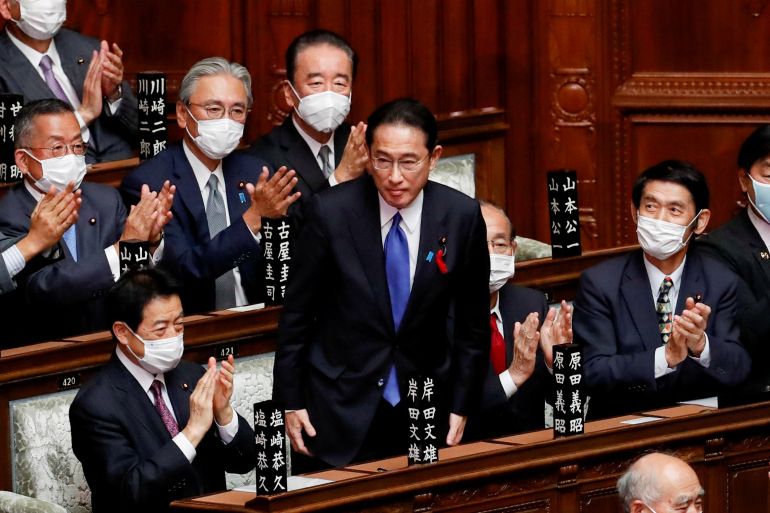Kishida elected as Japan’s PM, calls election for October 31
Fumio Kishida was formally elected as Japan’s prime minister on Monday.

Japan’s new prime minister, Fumio Kishida, has called a parliamentary election for October 31 and promised to bolster the country’s response to the coronavirus pandemic, shortly after being formally confirmed by lawmakers in the top job.
Kishida, a 64-year-old former foreign minister with an image as a consensus builder, earlier on Monday unveiled a cabinet lineup dominated by allies of former Prime Minister Shinzo Abe and ex-Finance Minister Taro Aso.
Keep reading
list of 4 itemsKishida to become Japan’s next prime minister after party vote
Japan’s ruling party chooses new leader to replace Suga
Japan to lift COVID state of emergency as cases drop
“I want to ensure we implement large-scale, bold coronavirus countermeasures and economic policies. To do that, we must ask the people whether they trust me, Kishida, to carry out these policies,” he said at his inaugural news conference.
“I would like to pursue a politics of trust and compassion with the people’s mandate,” he said, drawing on the main theme in his campaign to become leader of the Liberal Democratic Party (LDP), making politics more accessible to the public.
While Kishida may enjoy a honeymoon period usually afforded new governments, analysts said he probably did not want to lose time, given risks posed by the pandemic.
His decision to call an election came as a surprise to most analysts who had expected the election to be held in November. Parliament will now be dissolved on October 14.
Outgoing Prime Minister Yoshihide Suga enjoyed support ratings of about 70 percent soon after taking office about a year ago, but was pummelled by criticism of his handling of the pandemic, leading him to make way for a new face to lead the governing LDP through the election.
Kishida, a former foreign minister with an image as a low-key consensus builder, beat out three contenders last week to lead the party, ensuring he clinched the post of prime minister as the LDP has a majority in parliament.
“Kishida’s not wasting any time at all,” Tobias Harris, a senior fellow of the Center for American Progress, said on Twitter.
“October 31 puts the opposition on its heels, takes advantage of a honeymoon in the polls, plus a better chance of lower case numbers.”
Harris added, “If he wins comfortably in the general election and can hold things together well enough to win the upper house elections next year, he’ll have up to three years without an election.”
Abe’s shadow
Kishida’s poll decision was probably influenced by not wanting to repeat a mistake made by Suga, who did not call an election when his backing was still strong, analysts said.
“I believe he aims to hold the election before the general atmosphere [towards the new cabinet] turns cold,” said Zentaro Kamei, a senior fellow at the PHP Institute.
Kishida unveiled a cabinet featuring allies of Abe, so ensuring the influence of the latter’s conservative base.
He will replace all but two of 20 Cabinet posts under Suga and 13 are being appointed to ministerial posts for the first time, according to the Japanese media.
Foreign Minister Toshimitsu Motegi and Defence Minister Nobuo Kishi, who is Abe’s younger brother, are to be retained.
Finance Minister Aso will move to a top party post and be replaced by his 68-year-old relative, Shunichi Suzuki. Other jobs destined for Abe allies are the trade and industry portfolio, to be held by current Education Minister Koichi Hagiuda, who is close to Abe.
Kishida “won the election with the support of Abe and Aso, so now it’s time for him to return the favour, it’s not the time for him to cut them off,” said political analyst Atsuo Ito, adding that Kishida tended to rate safety over bold action.
The prime minister will also create a new cabinet post aimed at tackling economic dimensions of Japan’s national security, appointing 46-year-old Takayuki Kobayashi, who is relatively new to parliament.
There are three women in the lineup, one more than Suga had, but none of them holds a heavyweight portfolio.
Veteran female lawmaker Seiko Noda, one of four candidates who vied for the party leadership, became the minister in charge of the nation’s declining birthrate and local revitalisation.
Another woman, Noriko Horiuchi, became vaccinations minister, replacing Taro Kono, the runner-up in the party leadership race.
An urgent task for the new leader will be turning around his party’s sagging popularity, hurt by Suga’s perceived high-handedness on the pandemic and other issues.
He will also have to ensure Japan’s healthcare systems, vaccination campaign and other virus measures are ready for a possible resurgence of COVID-19 in winter, while gradually normalising social and economic activity.
Kishida is expected to make a policy speech later this week before he dissolves the lower house of parliament.